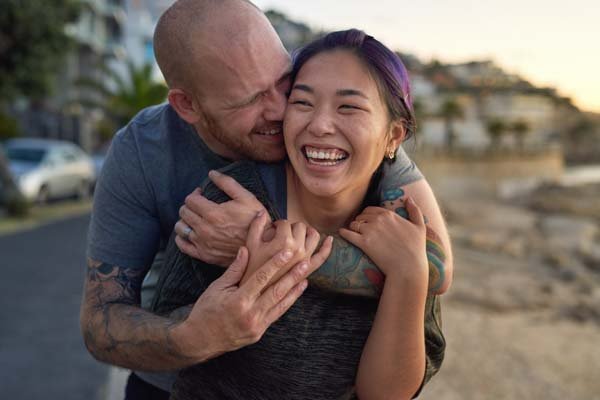When relationships hit rough patches, it’s easy to feel overwhelmed by the challenges. Couples counseling offers a structured process where two people fundamentally change how they relate. In a nutshell, I help couples team up against the neurological responses of the 4 F's: fight, flight, freeze, and fawn. These responses, while designed to protect us, can generate fights or disconnections that damage the relationship and prevent effective problem-solving.
Let’s break down how couples counseling works, focusing on the stages of progress that lead to meaningful change.
Stage 1: Symptom Reduction
The first goal in couples counseling is to reduce the intensity of the emotional symptoms—such as anger, frustration, or withdrawal—that often accompany relationship conflicts. As a therapist, I bring a neutral, calm presence to our sessions, which helps to lower the emotional temperature.
In the heat of the moment, it's difficult for partners to truly listen to each other because they are both vulnerable to feeling hurt or misunderstood. In therapy, I provide a space where both partners can express their thoughts and feelings without fear of immediate retaliation or dismissal. Because I’m not involved in your relationship, I’m not as reactive to the things you share, which allows me to help you both feel heard and validated.
This initial reduction in emotional reactivity is crucial. It creates a sense of calm and safety, making it easier for you to engage in productive conversations and lowering the energy that often escalates conflicts in your daily interactions.
Stage 2: Insight
Once the immediate emotional intensity is reduced, the next step is gaining insight into the patterns that drive your conflicts. Many couples find themselves repeatedly caught in the same types of arguments, even if the topics differ. You might find yourself thinking, "I didn’t expect to get in a fight over squeezing out the kitchen sponge, but how we got here feels really similar to all the other times."
As your therapist, I am essentially a process consultant for your relationship. My role is to help you identify the underlying patterns that create disconnection or conflict. These patterns often involve cycles where secondary emotions like anger, irritation, or frustration take center stage, overshadowing more vulnerable feelings such as fear, loneliness, sadness, or pain.
Understanding these dynamics is key because secondary emotions often lead to defensive behaviors, distancing, or attempts to break through your partner’s defenses. Unfortunately, when anger or frustration takes over, the original issue often gets lost, leading to a sense of dismissal and unresolved tension.
In this stage, I help you explore and express these deeper, more vulnerable emotions. This shift allows you to connect on a more authentic level, where you can address the root causes of your conflicts rather than getting stuck in reactive cycles.
You begin to see how your actions trulyi affect your partner. In loving relationships, this gets the other person’s attention in a way that fighting does not. I’ve often heard,”We’ve talked about this before, but this is the first time I’ve heard this.”
Stage 3: Practice
Insight alone isn’t enough to change deeply ingrained patterns. The next stage involves practicing new ways of interacting. We start by discussing practical procedures that can help you focus your conversations and communicate in ways that align with your true intentions.
One critical aspect of this practice is learning how to listen without becoming defensive or dismissive or attacking. I work with you to develop listening skills so that both partners feel heard and understood. This includes techniques for responding with empathy and staying engaged in the conversation, even when it becomes challenging.
Another important practice is learning how to recover from conflicts with effective apologies. Apologies in a relationship are not just about saying "I’m sorry." They involve taking responsibility, expressing genuine remorse, and making amends in a way that rebuilds trust and connection.
This stage of therapy is about building new habits. Just like any skill, effective communication and conflict resolution require repetition and practice. Over time, these new ways of interacting can replace the old, unproductive patterns.
Stage 4: Consolidation
The final stage of couples counseling is consolidation, where we work to solidify the changes you’ve made in your relationship. This involves integrating the new patterns and practices into your daily life, so they become the default way you interact with each other.
During this stage, we also focus on building resilience in your relationship. Life will inevitably bring challenges—whether it’s stress from work, parenting, health issues, or other external factors. The goal of consolidation is to ensure that your relationship has the strength and flexibility to withstand these upheavals and recover from any mistakes either of you may make.
Consolidation is about achieving equanimity in your relationship. With equanimity, you both can approach challenges with a sense of calm and balance, knowing that you have the tools and understanding to navigate conflicts constructively.
The Outcome: A Resilient, Connected Relationship
By working through these stages, couples can transform their relationship from one that is reactive and conflict-prone to one that is resilient and deeply connected. Couples counseling provides a roadmap for moving beyond the neurological triggers of fight, flight, freeze, and fawn, helping you build a relationship where both partners feel seen, heard, and valued.
If you’re considering couples counseling and are ready to take the first step towards a healthier relationship, I’m here to help. Whether you’re dealing with specific conflicts or simply want to strengthen your connection, I offer personalized counseling tailored to your needs. If you want to know how I help couples, look at my Marriage Counseling page. If you are in Minnesota, I can help in person or on video. Contact me by phone: 612-230-7171 or email through my contact page. Or you can click on the button below and self-schedule a time to talk by phone or video.
Together, we can help you build a relationship that not only survives but thrives, equipped with the tools to handle whatever life throws your way.



